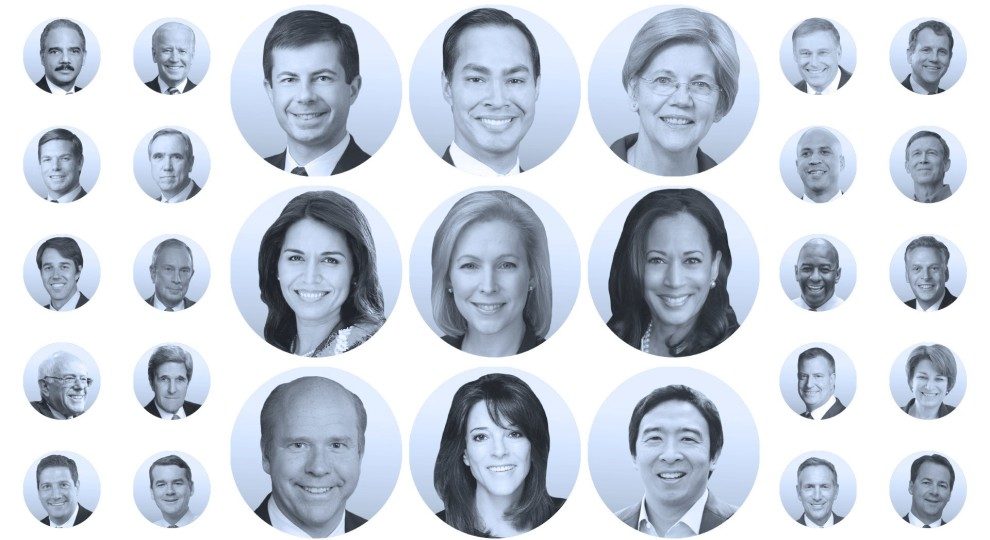Democratic presidential hopefuls are talking a big game about taxing the rich to pay for social programs.
Some ideas they’ve proposed so far—such as Senator Bernie Sanders’s plan to expand the estate tax, Senator Elizabeth Warren’s idea to impose an annual wealth tax on millionaires, or Senator Kamala Harris’s intention to repeal the Republican tax cuts—would raise some new tax revenue that Democrats would need to expand the social safety net. But Democrats will need trillions more to pay for key portions of some of the favored policy promises, including universal health care or free college tuition.
There are dozens of options of how to do that that haven’t yet been seriously discussed this cycle. Some potential revenue makers—such as increasing taxes on banks and hedge fund managers—are likely to be popular with many Democratic voters. But other proposals, such as introducing a carbon tax or eliminating a popular tax break for homeowners are likely to be less so, and could force a conversation in the party about what people might be willing to pay for a progressive agenda.
Here are a few of the possible ideas:
Tax Carried Interest
Revenue Projection: $15 billion
Democrats would like to get rid of a tax break on profits, known as carried interest, enjoyed by managers of hedge funds and private equity funds. Currently, those earnings are generally subject to the capital gains rates—23.8 percent—rather than income, which tops out at 37 percent.
Pros: Democrats nearly universally agree that private equity and hedge fund managers should pay higher rates on their profits. Even President Donald Trump has complained about the breaks they get.
Cons: The industry is likely to lobby heavily against changing this popular tax break. The $15 billion it would raise would not give Democrats a big advantage to fund their programs.
Increase the Gas Tax and Peg It to Inflation
Revenue Projection: $170 billion
The 18.4 cents-per-gallon gas tax hasn’t been raised since 1993, so lawmakers are debating increasing the tax—perhaps to 28.4 cents per gallon—and indexing it to inflation.
Pros: The gas tax increase has business-community support and could be used to pay for infrastructure improvement spending, which has wide bipartisan support, even if the gas tax itself does not.
Cons: The tax increase would hit low and middle earners, which could be politically dicey for Democrats to explain on the 2020 campaign trail. Strong opposition from anti-tax crusader Grover Norquist would dampen GOP support.
Charge Fees to Big Banks:
Revenue Projection: $61 billion
President Obama first introduced an idea to place a flat fee on banks with at least $50 million in assets. Senator Kamala Harris, who is running for the Democratic presidential nomination, has also generally expressed support for the idea.
Pros: The idea is popular with the progressive arm of the Democratic Party eager to tax Wall Street.
Cons: Critics say the plan won’t fix underlying problems with risk-taking and leverage at banks.
Gabbard ends task force that aimed to reform intelligence gathering after less than a year
Florida man allegedly points gun at multiple drivers during road rage confrontation
IRS erroneously shared confidential immigrant taxpayer data with DHS: court filing
Federal Judge releases four illegal immigrants convicted of murder, sex crimes from ICE Custody
Affluent Upper East Side explodes in outrage over controversial homeless shelter: ‘Unacceptable!’
Trump threatens ‘consequences’ after 6 House Republicans voted to reverse his Canada tariffs
Illegal alien youth coach could face death penalty after allegedly murdering, raping teen player
Wild Exchange: Nadler Makes Mistake of Insulting Bondi, Triggering a Scorched Earth Response Where She Brings the Receipts on His Hypocrisy and ‘Gutter’ Behavior
Chinese criminal gang allegedly recruited Navy members for sham marriages and base access
Trump directs military to strike new deals with coal-fired power plants: ‘Going to be buying a lot of coal’
Watch: Nadler Appears to Be Dead Asleep at Epstein DOJ Hearing – Same Hearing Where He Accused AG Bondi of Not Caring About Victims
Report: This GOP Advantage Has Some Democrats Panicking About Their Midterm Chances
GOP Senator Does Deep Dive on Trump Assassination Attempt and Remains Troubled by ‘Unresolved’ Questions
DHS unloads on anti-ICE Dems after man arrested with manifesto, ‘disturbing’ alleged plot to kill agents
Vehicle falls 500 feet off towering cliff along California scenic roadway, killing one
Raise the Social Security Payroll Tax Cap to $250,000
Revenue Projection: $807 Billion
Social Security taxes are only collected up to $132,900 in income. Raising the cap would effectively increase taxes on mid-to-high earners.
Pros: This would direct more taxes to Social Security, a popular program facing funding issues. It would also fit into Democrats’ campaign plan to tax higher earners to pay for their proposed new programs.
Cons: The tax would hit some earners considered middle class in more expensive areas.
Increase the Capital Gains Rate
Revenue Projection: $608 billion
Some Democrats have suggested increasing the tax on sales of capital assets—property, stocks, bonds—from 20 percent to 30 percent.
Pros: This tax would be targeted toward the rich because wealthier people derive much more of their income from capital gains, rather than wages.
Cons: Critics say this would deter people from making investments.
Eliminate the Mortgage Interest Deduction
Revenue Projection: $972 billion
This would eliminate an itemized deduction for homeowners on the interest they pay on their home mortgages up to $750,000.
Pros: The tax break mainly helps high-income individuals who both itemize and can afford to buy a home.
Cons: The move would be seen as removing a tax break for those aspiring to the American Dream, as well as face opposition from the housing and mortgage industries.
Gabbard ends task force that aimed to reform intelligence gathering after less than a year
Florida man allegedly points gun at multiple drivers during road rage confrontation
IRS erroneously shared confidential immigrant taxpayer data with DHS: court filing
Federal Judge releases four illegal immigrants convicted of murder, sex crimes from ICE Custody
Affluent Upper East Side explodes in outrage over controversial homeless shelter: ‘Unacceptable!’
Trump threatens ‘consequences’ after 6 House Republicans voted to reverse his Canada tariffs
Illegal alien youth coach could face death penalty after allegedly murdering, raping teen player
Wild Exchange: Nadler Makes Mistake of Insulting Bondi, Triggering a Scorched Earth Response Where She Brings the Receipts on His Hypocrisy and ‘Gutter’ Behavior
Chinese criminal gang allegedly recruited Navy members for sham marriages and base access
Trump directs military to strike new deals with coal-fired power plants: ‘Going to be buying a lot of coal’
Watch: Nadler Appears to Be Dead Asleep at Epstein DOJ Hearing – Same Hearing Where He Accused AG Bondi of Not Caring About Victims
Report: This GOP Advantage Has Some Democrats Panicking About Their Midterm Chances
GOP Senator Does Deep Dive on Trump Assassination Attempt and Remains Troubled by ‘Unresolved’ Questions
DHS unloads on anti-ICE Dems after man arrested with manifesto, ‘disturbing’ alleged plot to kill agents
Vehicle falls 500 feet off towering cliff along California scenic roadway, killing one
Introduce a Carbon Tax
Revenue Projection: $1 trillion
This would introduce a new $25 per-metric-ton tax on most emissions of greenhouse gases, such as those from oil and coal. The tax would be levied on products that create emissions.
Pros: The idea could curb carbon emissions, potentially slow climate change and has bipartisan support with prominent aides to former Republican administrations supporting the idea.
Cons: The tax would hit all households but would hit lower-income taxpayers harder than higher earners, because it would function like a sales tax on goods.
Repeal the Pass-Through Business Deduction
Revenue Projection: $414 billion
This would repeal the 20 percent deduction for partnerships, limited liability companies and S corporations introduced in the 2017 Republican overhaul.
Pros: The deduction has increased complexity for small businesses to file.
Cons: Without the deduction, corporate entities would have an advantage over pass-through businesses, and would pay a much lower tax rate—21 percent—than the 37 percent top rate other business types would pay.
Introduce a Value-Added Tax
Revenue Projection: $6.176 trillion
A 5 percent consumption tax at each step of the production process would raise significant revenue.
Pros: It creates a new, large-scale revenue stream and would make the U.S. tax system similar to those in European countries.
Cons: The tax is regressive, meaning it hits lower-income people harder than people who can afford higher consumer prices. It’s also a political nonstarter for Republicans, meaning it would be unlikely to pass unless Democrats won the White House and both houses of Congress.
Story cited here.
























